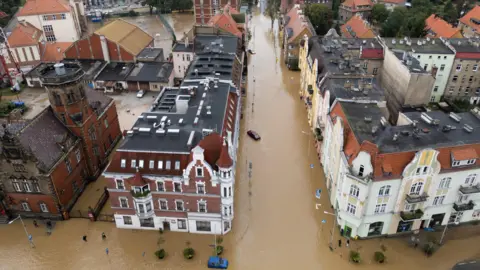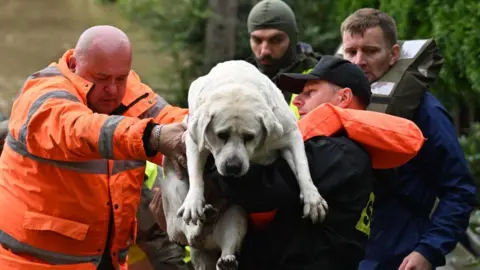 Reuters
ReutersThe mayor of a Polish city has asked that all 44,000 residents be evacuated as massive flooding continues to hit large swaths of central Europe.
Kordian Kolbiarz, the mayor of Nysa, asked people to move to higher ground, citing the risk of a dyke bursting and nearby lakes pouring water into the town.
The death toll from weekend floods that hit central Europe rose to 16 on Monday, with higher casualties in the Czech Republic, Poland and Austria.
Budapest said it would close roads near the Danube River that flows through the city due to the risk of flooding later this week.
“Please evacuate your belongings, yourself, your loved ones. It is worth getting to the top floors of buildings immediately because the waves can be several meters high. This means that the whole town will be flooded,” Mayor Colbia hereby writes.
Polish Prime Minister Donald Tusk said 1 billion zlotys (£197m) would be allocated to flood victims in the country, adding that Poland would also apply for EU bailout funds. His government also declared a state of natural disaster.
While conditions have stabilized in some places, others are bracing for more disruption and danger.
In Slovakia, the overflowing Danube River caused flooding in the Old Town area of the capital Bratislava. Local media reported that the water level exceeded 9m (30 feet) and was expected to rise further.
 Getty Images
Getty ImagesHungary is bracing for flooding in the coming days. Warnings were issued for 500 kilometers (310 miles) along the Danube River.
The river is rising about one meter every 24 hours, and the mayor of Budapest has provided residents with 1 million sandbags to prevent flooding.
Some tram lines will cease operations and river roads in the Hungarian capital will be closed starting Monday evening. Trains between Budapest and Vienna were also cancelled.
Hungarian Prime Minister Viktor Orban said on X that he was postponing all international obligations “due to extreme weather conditions and ongoing flooding in Hungary.”
The Czech Republic has the highest rainfall totals. The northeastern town of Jesenik has received 473 millimeters (19 inches) of rain since Thursday morning, five times the monthly average.
The Czech fire service delivered bottled drinking water to stranded villages, where people were told not to drink water from taps or wells as it could be seriously contaminated.
In the Austrian town of St. Pölten, more rain fell in four days than in the entire fall of 1950, the wettest season on record.
German Chancellor Karl Nehammer said armed forces had been deployed to provide assistance to areas hit by the storm. Austria’s climate ministry said it would provide €300m (£253m) in recovery funding.
With less than two weeks to go until September 29, most political parties have suspended their federal election campaigning.
Villages and towns in eastern Romania were flooded. The mayor of Slobodsia Konac, Emil Dragomir, told the media that the flooding had a devastating impact.
“If you were here, you would cry immediately because people are desperate, their life’s work is gone, some are left with nothing but the clothes they were wearing,” he said.
Thousands of people in Poland have been evacuated, including staff and patients at a hospital in the town of Nysa. Roads were severely disrupted and train traffic suspended in many parts of the country.
On Monday morning, the mayor of Patzkow in southwestern Poland called on residents to evacuate as water from a nearby reservoir began to overflow, endangering the town.
However, in other parts of Poland, water levels are falling, according to local officials.
Michal Piszko, the mayor of Klozko, told Polish media that the floodwaters had receded and there were signs that the worst was over.
Video footage from Monday morning showed that downtown streets that were flooded on Sunday were now without water, but it also revealed the extent of damage to buildings.
Where will Storm Boris go next?
More rain is expected on Monday and Tuesday in Austria, the Czech Republic and southeastern Germany, with an additional 100mm possible.
While it may take several days for the floods to recede, the weather will improve and become drier in central Europe from mid-week.
However, Storm Boris will now move further south towards Italy, where it will intensify again and bring heavy rain. The Emilia-Romagna region was the worst affected, with rainfall of 100-150 mm.
Record rainfall in central Europe is caused by a number of factors, including climate change.
Different weather factors combine to create a “perfect storm” where extremely cold air from the Arctic meets warm air from the Mediterranean.
Patterns of atmospheric pressure also mean Storm Boris can be trapped in one place for a long time.
Scientists say a warmer atmosphere holds more moisture, causing rainfall to be more intense. Warming oceans also lead to more evaporation, feeding storm systems.
For every 1 degree Celsius increase in global average temperature, the atmosphere can accommodate Moisture increased by approximately 7%.



